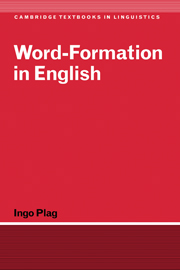Book contents
- Frontmatter
- Contents
- Preface
- Abbreviations and notational conventions
- Introduction
- 1 Basic concepts
- 2 Studying complex words
- 3 Productivity and the mental lexicon
- 4 Affixation
- 5 Derivation without affixation
- 6 Compounding
- 7 Theoretical issues: modeling word-formation
- Answer key to exercises
- References
- Subject index
- Affix index
- Author index
Answer key to exercises
- Frontmatter
- Contents
- Preface
- Abbreviations and notational conventions
- Introduction
- 1 Basic concepts
- 2 Studying complex words
- 3 Productivity and the mental lexicon
- 4 Affixation
- 5 Derivation without affixation
- 6 Compounding
- 7 Theoretical issues: modeling word-formation
- Answer key to exercises
- References
- Subject index
- Affix index
- Author index
Summary
Chapter 1
Exercise 1.1
A grammatical word is a word that is specified for grammatical categories and can occur as such in a sentence. Thus, walked in (a) is a grammatical word because it is a verb that is specified for tense, in this case past tense. In (b), walk is also a grammatical word, because it is a verb used in the second person (even though second person is not overtly marked on the verb). Walked, walk, and walking are all different forms, i.e. ‘word-forms,’ of one underlying word, the so-called lexeme, walk. The word-forms walked, walk, and walking are also orthographic words, because they occur between blank spaces. The word-form walking is part of a larger grammatical word, the compound walking stick (‘a stick for walking’). This compound is represented by two orthographic words.
Exercise 1.2
Morpheme: the smallest meaningful unit, e.g. walk and -ed in walked.
Prefix: a bound morpheme that is attached in front of a base, e.g. de- in decolonialize.
Suffix: a bound morpheme that is attached after a base, e.g. -ed in walked.
Affix: the cover term for prefix, suffix, infix, e.g. de-, -ed, -bloody- are all affixes.
Compound: a word made up of two bases, e.g. apartment building.
Root: the smallest, central, meaningful element of the word, e.g. colony in decolonialize.
Truncation: a morphological process by which the derived word is created by subtracting material from the base, as in Rob (← Robert).
- Type
- Chapter
- Information
- Word-Formation in English , pp. 193 - 227Publisher: Cambridge University PressPrint publication year: 2003



